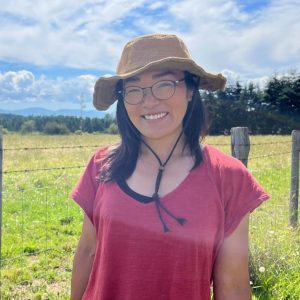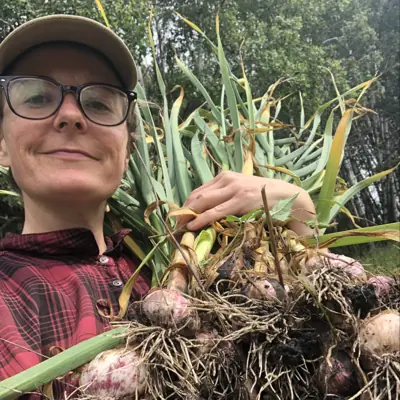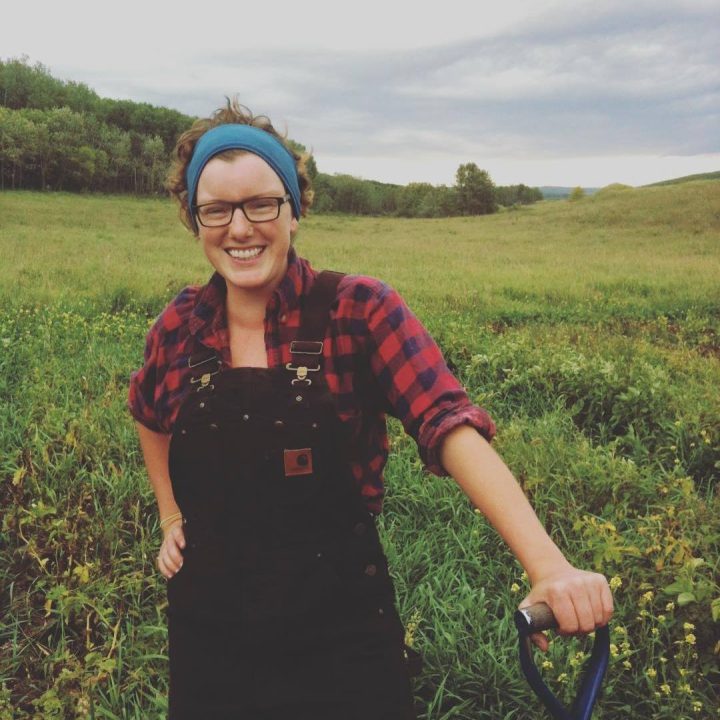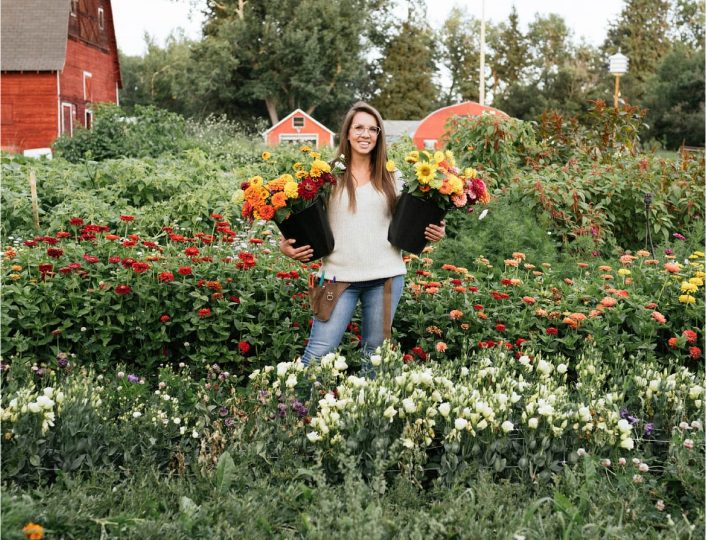 Filter by Popular Categories
Filter by Popular Categories
Apprenticeship Program
Are you an aspiring farmer looking to gain skills and knowledge that match the ecological and regenerative values you hold? Are you feeling the farming bug, but not quite ready to take the plunge and launch your own business?
YA’s network of exceptional host farms in British Columbia, Alberta, Saskatchewan and Manitoba are offering hands-on farm apprenticeships in regenerative agriculture.
Our apprenticeships are a full immersion program that puts you into the heart of running a farm business, day in and day out. Our carefully selected family of host farms have diverse expertise and skill sets to teach you. They are chosen because their farm philosophy is guided by ecological and holistic values that recognize the connectedness of the land and people. Although activities vary from farm to farm, apprentices can learn about:
- Caring for the soil and health of the land
- Grazing livestock to manage pastures and grasslands
- Using regenerative practices for grain and vegetable growing
- Farm direct marketing
- Community building and networking
What To Expect
Duration:
Apprenticeships range from 4 – 8 months. Most start April/May and end September/October. Start dates and end dates will be determined by the host farm and apprentice.
Hours:
Work hours will vary with the season. Living on a farm, there will be continuous change as the seasons evolve. While summer months offer abundance and long hours, winter brings shorter days, cold weather, and a slower pace.
Compensation:
While the greatest benefit to apprentices is to learn by being fully immersed in the day-to-day of the host farm, this is a paid apprenticeship. Compensation varies from farm to farm and each apprenticeship is supported by an employment contract that lays out the work hours, compensation, expectations, days off and any other benefits like housing, food, etc.
Days Off:
Apprentices are encouraged to clarify details pertaining to days off and paid leave with their host farms as soon as possible upon receiving their apprenticeship.
Insurance:
Each host farm is required to have Workers Compensation coverage and insurance.
Housing:
For host farms providing housing, YA works to ensure it is safe and secure. Some farms have a room in the host farm’s residence while others have separate housing for apprentices. Amenities like internet, laundry, etc. are listed in the host farm profiles.
Food:
Gathering to share food is at the heart of this program! On the farm, some hosts will provide ranch or farm products, while others will have shared meals. Apprentices may be expected to participate in food preparation and clean-up. Orientation and farm tours include some of the most amazing potlucks you will ever experience! Apprentices will be expected to bring a dish to these events.

Welcome &
Orientation:
Apprentices attend an online welcome in April and an in-person orientation in May. Attendance at these events is mandatory. The orientation will prepare you for your learning journey: you will learn about ecological and regenerative agriculture, connect with your fellow apprentices, meet the project coordinators, and have fun together.
On-Farm
Check-Ins:
We encourage host farms to have regular check-in throughout the season to review skills checklists, discuss learning goals, observations, and general concerns or questions that arise.
Farm Tours &
Workshops:
As part of the program, apprentices will also visit other farms to learn from other ecological and regenerative farmers, be exposed to different perspectives and practices, and make connections with other apprentices in the program. These events are organized by the YA coordinators but we encourage apprentices to help out! Additional online workshops will be organized and include topics like Indigenous Food Sovereignty and Farming, Holistic Management and Soil Health. Being a part of the Young Agrarians network will also open opportunities for more events and education!
Learning to
Observe:
Apprentices are encouraged to keep a journal and to record weather, hours worked, activities, observations, learning goals and questions that arise. The farm log is used to guide your check-in with host farm and program coordinators.
One-on-one
Support:
The YA Staff are here to support you! We will have check-ins with each apprentice and help you develop your learning strategy. Phone calls, group chats and emails will be the primary form of communication throughout the season, but your provincial Coordinator will always be available to support you.
Peer-to-Peer Networking:
Apprentices will have the opportunity to network with fellow apprentices, local farmers, agricultural professionals and meet other young agrarians. Each apprentice is responsible for organizing a farm tour with potluck, and will visit other apprentices’ farms.
Closing Retreat
& Final
Reflections:
Apprentices will gather for a final weekend, usually in September, to reflect on their apprenticeship experience. They will be invited to share a Final Reflection Project that captures their time and can be shared with future new farmers.
British Columbia Farms
| FARM | TOWN | WHAT YOU'LL LEARN | POSITION |
|---|---|---|---|
| Ntamtqen Community Garden & Food Hub | Cawston, BC | Market garden, vegetable, Indigenous Food Sovereignty | Open |
| A Rocha Farm | South Surrey, BC | Market garden, vegetable | Closed |
| Amazia Farm | Oliver, BC | Organic, vegetable | Closed |
| Braden Hill Orchard & Farm | Summerland, BC | Apple orchard, market garden | Closed |
| City’s Edge Farm | Victoria, BC | Vegetable, strawberry, herb, cut flower, seedling | Closed |
| Gathered Farm and Florals | Powell River, BC | Vegetable, flower, foraging, farm to table, agritourism | Closed |
| Glorious Organics | Aldergrove, BC | Organic, vegetable, cooperative | Closed |
| Lost Farm | Smithers, BC | Market garden, vegetable, herb | Closed |
| Solstedt Organics | Lytton, BC | Organic, vegetable, tree fruit | Closed |
| Spray Creek Ranch | Lillooet, BC | Organic, livestock grazing, cattle, sheep, pigs, poultry | Closed |
| Terra Nostra Farm | Powell River, BC | Organic, vegetable | Closed |
| Whiskey Creek Ranch | Rose Prairie, BC | Organic, livestock grazing, cattle, pigs, poultry, bees | Closed |
Alberta Farms
| FARM | TOWN | WHAT YOU'LL LEARN | POSITION |
|---|---|---|---|
| Chickadee Farm Herbs | Flatbush, AB | Herbs, dried flowers | Open |
| Ladys Hat Farm | Castor, AB | Flower production and arranging | Open |
| Mark & Tracy Vetsch Farms | Valleyview, AB | Organic beef and grains | Open |
| Prairie Hardy Nursery | Two Hills, AB | Tree nursery | Open |
| Rosy Farms | Alcombdale, AB | Haskap production, processing, and sales | Open |
| The Homestead | Goodfare, AB | Organic beef, pork, chicken, eggs, microgreens, and veggies | Open |
| Triple Lyoness Farm | Westlock, AB | Organic beef, chicken, and egg production | Open |
| Woody Nook Gardens | Lacombe, AB | Vegetables and flowers | Open |
| Common Ground Garden Project | Red Deer, AB | Urban farming, market garden | Closed |
| Ellis Nature Centre | Lacombe, AB | Beef, eggs, goats, bees, non-profit programming and events | Closed |
| Land of Dreams Multicultural Community Farm | Calgary, AB | Urban farming, market garden | Closed |
| Reclaim Organics | Pigeon Lake, AB | Market garden, vegetable, flower, and microgreen production | Closed |
Saskatchewan Farms
| FARM | TOWN | WHAT YOU'LL LEARN | POSITION |
|---|---|---|---|
| Grovenland Farm | Lanigan, SK | CSA, vegtable growing, cattle, chickens, pigs | Open |
| McKnight Ranch Land & Livestock | Hazlet, SK | Cattle ranching | Closed |
| Springer Family Farm | Foam Lake, SK | Mixed farm, cattle, mixed grain, tea compost, alfalfa bees | Closed |
| Upland Organics | Wood Mountain, SK | Organic grain, cattle, pigs, chickens, bees | Closed |
Manitoba Farms
| FARM | TOWN | WHAT YOU'LL LEARN | POSITION |
|---|---|---|---|
| Boreal Ranch | Lac Du Bonnet, MB | Chickens - broilers, layers, and market gardening | Open |
| Circle H Farms and Solar Nutrition | Brandon, MB | Cattle, rotational grazing, farm store | Open |
| Dunrea Farming Company | Dunrea, MB | Market gardening, garlic, farm stand | Open |
| Fostering Change Farm | Balmoral, MB | Pigs, cattle, goats, chickens (broilers and layers) | Open |
| Hnatiuk Market Gardens | East St. Paul, MB | Market gardening, no till intensive beds and larger crop acres | Open |
| Phil's Honey | Starbuck, MB | Medium scale apiary, beekeeping | Open |
| Rafter L Ranch | Fisher Branch, MB | Cattle, horse back management, part time work | Open |
| Skinner Native Seeds | Inglis, MB | Native seeds, wild harvesting | Open |
| Tamarack Farms | Erickson, MB | Native seeds, tractor work, grain | Open |
| Almost Urban Vegetables | Winnipeg, MB | Market garden | Closed |
| Long Way Homestead and Ferme Fiola Farm | Ste-Geneviève, MB | Sheep, wool production, wool mill, felting machine, hay production | Closed |
| Oak Knoll Farm | Oakbank, MB | Market gardening, resteraunt supply, pigs, layers, broilers, u-pick berries | Closed |
Applications
Who should apply
You should apply if:
- You have a serious interest, curiosity and commitment to getting your hands dirty.
- You’re willing to commit for the duration of the program (ranging from 4 to 12 months).
- You’re 16 years of age or older. If you are under the age of 18, you need permission from your guardians to participate.
- You’re a Canadian Citizen, Permanent Resident or have Refugee Status. International applicants must have a work visa. The Young Agrarians Foundation is unable to provide sponsorship.
Apply as an apprentice
Apprentice Application Process:
Only complete applications will be reviewed by the host farms.
STEP 1: Online Application
Step one fill out an online application.
STEP 2: Telephone Interviews
Successful applicants will be contacted for an interview with the host farm and program coordinators.
STEP 3: Initial Farm Visit
Selected applicants are encouraged to visit the host farm for 3-5 days*. After this visit both parties will decide if they will proceed with the program. (*the program does not provide funding for this initial visit)
STEP 4: Offer of Apprenticeship
Position
Confirmation of successful applicants will be in February.
STEP 5: Participant Fee Payment
Participants who are accepted into the program are required to pay $175 before the start of their apprenticeship to secure their position in the program.
STEP 6: Placements Begin
Apprentice start dates vary by farm however are generally April or May.
Apply as a host farm
Are you a Farmer interested in hosting an apprentice?
You should apply if:
- You’re a farmer who’s a dedicated steward of the land;
- Are a skilled and enthusiastic teacher who have a passion for teaching young and aspiring farmers;
- Have a farm philosophy that recognizes the connectedness of the land and people.
frequently asked questions
How long is an apprenticeship?
The apprenticeship program starts in April and goes until October. Apprentices and Host Farms will have access to YA Coordinators and support during that time. Apprenticeships can be shorter depending on the needs of both the host farm and apprentice. They can also lead to longer term employment.
How much time does an apprentice spend training with the host farmer?
Host farm are full-time farmers and ranchers. So, apprentices can expect to be working alongside the host farmer, especially at the beginning. The apprenticeship is also a paid position, so apprentices should expect to be working independently as they become increasingly familiar with day to day tasks. Though time spent training during the work day and after hours will vary, coordinators help apprentices and host farms set expectations before the start of the apprenticeship. A skills checklist is one of the tools used to set goals for skills development outcomes specific to the apprentices interests and the host farm’s expertise.
Is this a paid apprenticeship?
Yes. However, compensation will vary farm to farm. Host farms and apprentices will be supported in developing an employment contract. The contract will clearly outline expectations regarding working hours, time off, length of employment, accommodations, etc. and any other benefits that may be included. Host farms will also be supported in identifying potential wage subsidy programs.
Are there age restrictions?
Yes. Age restrictions are in alignment with provincial labour laws and applicants under the age of 18 will need permission from their legal guardians to participate. Some host farms do rely on wage subsidy programs that have age limitations and will select applicants based on that criteria.
Are there any pre-requisite skills as an apprentice?
No. These positions are entry level and aspiring farmers are encouraged to apply. Host farms are looking for energetic self-starters, problem solvers and good communicators up for a challenge. Be ready to work outdoors in a variety of weather.
I'm interested in being an apprentice, how do I learn more?
Look at the host farm list and see who is there, and what you are interested in. Try and match what you want to learn with the farms and highlight this on your application. Reflect on what you want to get out of the program.
It can also be beneficial to come to a YA event and get to know the community – you might meet a potential host farm there. You could also reach out to the farms directly – for instance, if you meet a farmer at the farmers’ market, ask if they have volunteer opportunities.
I’m interested in being a host farm: how do I learn more?
An apprenticeship is more than a job posting; it is an investment in the next generation of farmers and ranchers. But, it’s also an investment that can pay dividends for your farm and family. Apprentices bring a new energy and enthusiasm to the work and a successful match can lead to long term employment and/or connections. You can learn more here, but the best way to learn is to reach out to your provincial coordinator directly and set up a time to chat. Provincial coordinator contact information can be found on the bottom of this page.
What if this apprenticeship doesn’t go as planned?
Coordinators are ready to support both host farms and apprentices in navigating unexpected situations that may arise from a variety of circumstances. The YA Apprenticeship Team has a variety of tools to help get the apprenticeship back on track, facilitate difficult conversations, or successfully terminate an agreement. The Team will also provide each participant with a list of resources available to sector stakeholders and employees that can help each of us move forward in a sometimes difficult occupation with a variety of stressors.
I am a student, can I use this experience for a co-op placement?
Yes. You’ll need to work with your co-op coordinator at your university or college and liaise with the YA Apprenticeship Coordinator in your province.
Does the YA Apprenticeship Program accept international applications?
All applicants to the YA Apprenticeship Program must be eligible to work in Canada. Sponsorship is beyond the scope of the program.
If you are applying from another country, please read carefully:
To participate in the Apprenticeship Program international applicants must have a work visa. The Young Agrarians Foundation is unable to provide sponsorship.
If you do not have a visa, we encourage you to look into the International Rural Exchange Canada Inc. (IRE) is an organization that helps international agricultural trainees find work placements: https://awaytowork.ca. You may also want to look into the IEC program. To find out which countries are participating in the IEC, click here. If none of the above options are available to you, you may want to try to go through a registered immigration consultant.
Learn more on our resource page here.
Disclaimers
- The Young Agrarians Apprenticeship program curriculum and materials have been inspired and adapted from the Quivira Coalition’s New Agrarian Apprenticeship program.
- Photo credits: Mich Lam
still have questions?
contact

Kiyomi Ito
She/her
B.C. Apprenticeship Program Coordinator
(Previously Land Matcher - Vancouver Island & Gulf Islands)
Email: kiyomi@youngagrarians.org
Kiyomi is a city girl turned cow lover turned farmer and local food enthusiast. Growing up in a city in Japan, Kiyomi’s journey into agriculture started when she accidentally fell in love with dairy cows during her studies at the University of British Columbia. Her love of cows took her on a wild tour across Canada and the United States, working as a cow behaviourist and dairy scientist. In 2013, she landed on Vancouver Island, where she has expanded her interests – learning to be an organic vegetable grower, free-range egg grader, farm store clerk, and Integrated Pest Management specialist, alongside starting her own microgreens and market garden ventures. In 2022, Kiyomi’s winding journey led her to her role as a Land Matcher for Vancouver Island and Gulf Islands. Through this work, she found her way onto a farm on Salt Spring Island where she is learning to raise beef cattle and laying hens. As a BC Apprenticeship Coordinator, Kiyomi is grateful for the opportunity to support aspiring farmers like herself to get farming!

Steven Olsen
He/him
Alberta Apprenticeship Program Coordinator
Email: steven@youngagrarians.org
Steve grew up on his grandparents’ and parents’ small cattle and sheep ranch on Treaty 7 territory just outside of Cardston, Alberta. After spending a few years living in cities across Canada, setting up a container garden on his balcony, and volunteering at an urban farm in Montreal, he felt drawn back to his agricultural roots. He then studied Permaculture and traveled throughout Latin America, WWOOFing—volunteering in exchange for room and board—to deepen his knowledge. He completed a farm internship in Cawston, BC, and spent 3 years working with an NGO, promoting Agroecology in Honduras. He came back to Canada in 2019, and after a year working as a Program Manager with Environment Lethbridge, he and his husband, Julián, decided to move to the Olsen family farm and start their own farm, Milpa Naturals. They produced broiler chickens and herbs for 4 years before moving to Edmonton in 2025.

Alieka Beckett
She/her
Apprenticeship Program Administrator & Saskatchewan Coordinator
Email: saskatchewan@youngagrarians.org
Alieka has over 5 years of experience in work integrated learning (WIL) specializing in creating career opportunities for young people through apprenticeship programs. She is passionate about investing in the next generation of farmers, recognizing that this is key to maintaining healthy food systems and land sustainability.
In her personal life, Alieka is a hobbyist vegetable grower, flower grower, and a self-proclaimed tree hugger. Her love for nature and dedication to farming aligns with her professional mission to promote hands-on learning and encourage young people to pursue careers in agriculture and environmental stewardship.

Sara Yagelniski
She/they
Manitoba Apprenticeship Program Coordinator
Email: saray@youngagrarians.org
Sara Yagelniski grew up on a poultry farm outside Russell, Manitoba, and did not consider farming as her future until she found herself volunteering on small organic farms (WOOFING) around South and Central America. These experiences, along with attending the University of Winnipeg, turned her focus toward local food systems and more ecological ways of farming.
Since then, she has worked on livestock, vegetable, fruit, and grain farms in Manitoba, Saskatchewan, and BC and has been involved in many community-based garden and permaculture projects. She co-operated a small market garden outside Onanole, Manitoba, for three years and has been growing garlic commercially since 2019. She has also worked in many outdoor-focused kids’ programs, including directing and running a farm kids’ camp.
With a crafty laugh, Sara has been known to convince people to join her tromping around the bush or garden — picking herbs, brewing tea, digging roots, moving chickens, spreading compost, or pounding kraut.

Kalynn Spain
She/her
Manitoba & Apprenticeship Program Manager
Email: kalynn@youngagrarians.org
Kalynn Spain is a bridge builder in the agricultural community in Manitoba. Her joys in work include empowering aspiring farmers, creating collaborative partnerships across agri-food sectors and fostering strong urban/rural connections. After graduating with a degree in conflict resolution, Kalynn initiated the creation of a public database of direct marketing farms, visiting and working on many of these in the process. Through collaboration with others, these 80+ profiles became a network of farms and farmers’ markets that are now represented by Direct Farm Manitoba, where Kalynn serves as a board member. Kalynn has developed strategic plans with the Faculty of Agricultural and Food Sciences and Keystone Agricultural Producers that have furthered the success of young and aspiring farmers. Kalynn enjoys supporting and facilitating meetings for families who are going through farm transition as a farm coach. Kalynn lives on Treaty 2 territory in the Interlake region of Manitoba with her partner and two young children. They have dabbled in raising pigs and sausage-making and are navigating the challenging yet hopeful process of farm succession with his parents, who run a mixed farming operation.


 Filter by Popular Categories
Filter by Popular Categories


